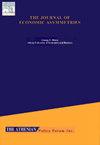The asymmetric impact of fiscal decentralization on ecological footprint-accounting for methodological refinements and globalization facets
Q1 Economics, Econometrics and Finance
引用次数: 0
Abstract
In the wake of global climate change, this study tries to reconcile the competing evidence on the fiscal decentralization–environmental sustainability nexus by examining the impact of the regional authority index, a comprehensive index of decentralization, on ecological footprint - a novel and composite indicator of environmental sustainability. Using novel econometric techniques to account for potential asymmetry and endogeneity issues, such as the dynamic panel threshold methodology, and quantile techniques, on a sample of 53 countries over two decades, we find robust evidence that the effect is non-linear and conditional on the degree of fiscal decentralization. Decentralization exerts a favourable impact on ecological footprint in lower regime countries owing to positive externalities, while the adverse impact of the same is observed in higher regime countries due to the “race to the bottom” phenomenon. Furthermore, the mediating channels of political and financial globalization weaken the positive externalities spillover, whereas social and cultural globalization mitigates the “race to the bottom” effect, addressing the on-going debate about the trade-off between globalization and environmental sustainability. The effective mitigation of climate change impacts under sub-national governance is thus conditioned by an optimal mix of decentralization policies at the ground level, backed by global exchange of socio-cultural policies promoting ecological awareness.
财政分权对生态足迹的不对称影响——方法改进和全球化方面的核算
在全球气候变化的背景下,本研究试图通过考察区域权力指数(分权的综合指数)对生态足迹(一种新的环境可持续性综合指标)的影响,来调和财政分权与环境可持续性关系的竞争性证据。使用新的计量经济学技术来解释潜在的不对称性和内质性问题,如动态面板阈值方法和分位数技术,在53个国家的20年样本中,我们发现了强有力的证据,表明这种影响是非线性的,并且取决于财政分权的程度。由于正外部性,权力下放对较低制度国家的生态足迹产生了有利影响,而在较高制度国家,由于“逐底竞争”现象,权力下放对生态足迹产生了不利影响。此外,政治和金融全球化的中介渠道削弱了正外部性溢出效应,而社会和文化全球化则缓解了“竞底”效应,解决了关于全球化与环境可持续性之间权衡的持续争论。因此,在次国家治理下有效缓解气候变化影响的条件是,在基层实行权力下放政策的最佳组合,并辅之以促进生态意识的社会文化政策的全球交流。
本文章由计算机程序翻译,如有差异,请以英文原文为准。
求助全文
约1分钟内获得全文
求助全文
来源期刊

Journal of Economic Asymmetries
Economics, Econometrics and Finance-Economics, Econometrics and Finance (all)
CiteScore
4.80
自引率
0.00%
发文量
42
审稿时长
50 days
 求助内容:
求助内容: 应助结果提醒方式:
应助结果提醒方式:


